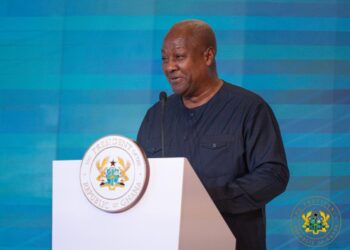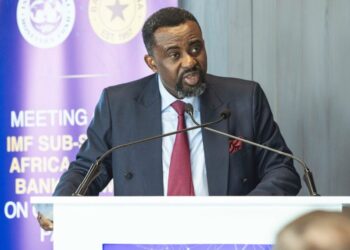President John Dramani Mahama has revealed that the recent appreciation of the Ghanaian cedi has significantly reduced the country’s total debt burden by nearly GH₵150 billion.
He made this at a high-level presidential session during the 60th Annual Meeting of the African Development Bank (AfDB) and the 51st Annual Meeting of the African Development Fund (ADF) in Abidjan on Tuesday, May 27.
The AfDB Annual Meetings serve as a platform for African leaders, policymakers, and development partners to strategies on sustainable growth and economic transformation across the continent.
President Mahama noted that Ghana is now well on track to achieve its medium-term debt sustainability targets ahead of schedule.
He explained that a weaker cedi in previous years had contributed significantly to the country’s debt accumulation, as more local currency was required to service debts denominated in foreign currencies.
The strengthening of the cedi, he said, has reversed this trend, providing substantial fiscal relief.
President Mahama added that if the current trajectory continues, Ghana could meet its debt-to-GDP target of 55 to 58 percent by the end of 2025—three years earlier than the original 2028 projection.
The President credited this progress to a combination of fiscal discipline and bold monetary policy interventions introduced by his administration over the last five months.
These measures, he said, have stabilised the macroeconomic environment, restored investor confidence, and created fiscal space for productive investments.
He also pointed to improved foreign exchange inflows, increased exports, and renewed macroeconomic stability as factors driving the cedi’s recent gains against major currencies, particularly the US dollar.
While acknowledging the positive impact of the cedi’s rebound, Mahama emphasised that his government remains focused on long-term economic reforms.
He said, “One of the push factors for the debt is the strength of the value of the local currency,” he explained. “Our debt continued to multiply because the cedi continued to grow weaker, and so you needed more cedis to service foreign-denominated debt. Fortunately, the measures we have put in place have begun to show results, and the cedi has been strengthening. We’ve reduced our total debt over the last five months by almost 150 billion cedis, which is very significant.”
“If that trajectory continues, the target of reaching 55 to 58 per cent debt sustainability by 2028 will be reached by the end of this year, and that means that it gives us fiscal space to begin to invest in the most productive sectors of the economy,” he stated.
“We need to look inward, boost domestic revenue, cut wasteful government expenditure, fight corruption, and introduce better accountability in governance,” he stressed.





































